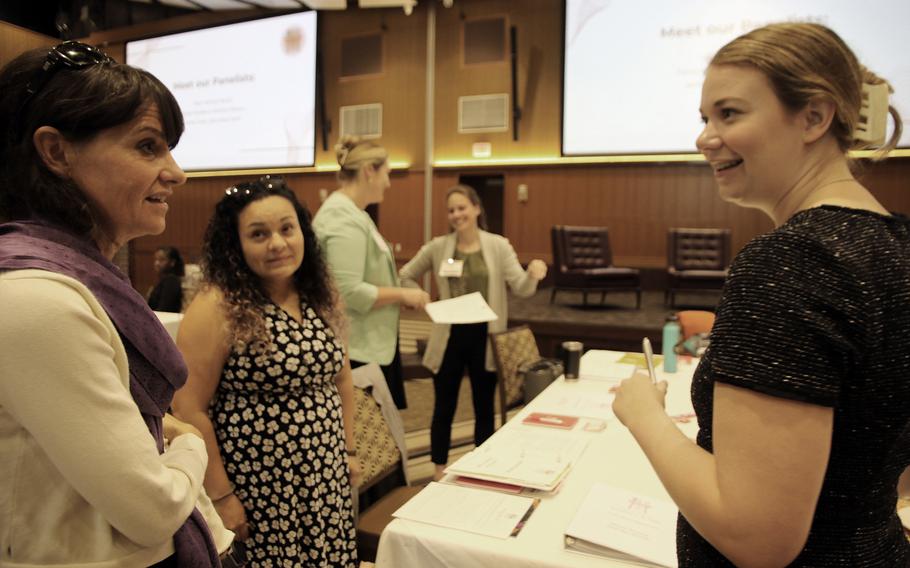
Military spouses from across Okinawa network at the Rocker Enlisted Club on Kadena Air Base, Japan, during the fall Okinawa Leadership Seminar on Wednesday, Oct. 4, 2023. (Matthew M. Burke/Stars and Stripes)
KADENA AIR BASE, Okinawa – Dozens of active-duty military spouses on Okinawa gathered here last week for a biannual conference to address the challenges they face in military life and to strengthen their network of mutual support.
The fall Okinawa Leadership Seminar began Tuesday and drew about 40 spouses from various branches to the Rocker Enlisted Club for three days of networking, panel discussions, group activities and lectures.
The group, a 501(c)3 non-profit, was founded by Marine Corps wives in 2016, based on a similar forum at Marine base Camp Pendleton, Calif., said Latoya Scott, group president and a Marine Corps spouse. The seminars have since spread to bases around the world.
“A lot of times we face challenges thinking we’re all by ourselves, so when you come to a seminar such as this, you realize, ‘I’m not alone,’” Scott said.
Military spouses face several challenges, from maintaining gainful employment to finding adequate child care, and coping with food insecurity and issues with mental health, according to a 2021 Defense Department survey of active-duty spouses.
Women made up 91% of approximately 600,000 active-duty military spouses that year, according to a Defense Department demographics survey.
Of nearly 12,000 spouses who responded to the 2021 spouses survey, 21% were unemployed, mostly due to a lack of access to child care, 25% suffered low food security and more than half lacked regular access to child care, mostly due to the COVID-19 pandemic.
Over 80% had experienced at least one move from one military base to another, a permanent change of station, the data said. Only 49% reported being satisfied with the military way of life, down steadily since 2012, according to the report.
Participants in the survey were 87% female, the data said.
Henry Tapia, an Air Force spouse and the only male at the conference, said he attended to advance his goal of becoming more financially secure.
On Wednesday, the forum began with professional headshots and a bingo variation that compelled attendees to introduce themselves to one another. Attendees wrote their questions and needs on message boards where others could respond..
A panel discussion followed with Scott, the public relations director; Christina Joy Glisson, the administrative director; seminar treasurer Jamie Conti; and Kathryn Roche. The women told their stories of starting businesses, going to school, raising children and struggling with moves and military life.
Glisson, a Marine Corps spouse, said she built a formidable resume through volunteer opportunities on bases where she lived. Scott described starting her own business, Final Touch Models, in 2002 to fulfill a desire to make her own money.
“I like to do things outside of my kids and outside of my husband,” Scott said.
Conti implored the audience to take risks. The group also talked about the importance of self-care.
After a lecture on emotional intelligence, attendees separated into groups to discuss emotions and their consequences. Kelly Eaton, a Marine spouse and Defense Department preschool teacher, said she battles feelings of guilt for working rather than doing all of the housework of a stay-at-home mom.
“I know everything’s going to be fine at home; my husband’s very supportive,” Eaton said. “It’s just my own feelings of guilt that I am not able to be there for everybody all the time.”
She was looking for tips to overcome these feelings and bring “balance” to her life, she said.
Navy Petty Officer 1st Class Leticia O’Connor, an information technology specialist with Fleet Support Unit Seven, attended the conference to prepare for the day when she must support her Navy husband as a civilian.
“Coming to this and seeing there’s so many independent women that are wanting to do more and learning; it’s phenomenal,” she said. “I’ve learned so much already.”